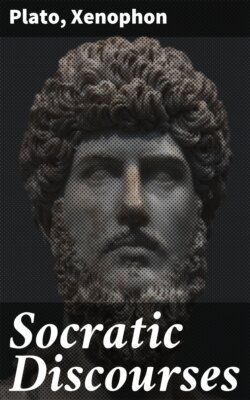Читать книгу Socratic Discourses - Xenophon - Страница 14
На сайте Литреса книга снята с продажи.
CHAPTER VII
ОглавлениеTable of Contents
Dissuasions from ostentation. He that desires to be distinguished, should endeavour to be what he would wish to seem. He that pretends to be what he is not, exposes himself to great inconvenience and ridicule, and may bring disgrace and detriment on his country.
1. Let us consider also, whether, by dissuading his followers from ostentation, he excited them to pursue virtue. He always used to say that there was no better road to honourable distinction, than that by which a person should become excellent in that in which he wished to appear excellent.
2. That he said what was just, he used to prove by the following arguments. “Let us consider,” he would say, “what a person must do, if, not being a good flute-player, he should wish to appear so? Must he not imitate good flute-players in the adjuncts of their art? In the first place, as flute-players procure fine dresses, and go about with a great number of attendants, he must act in a similar manner; and as many people applaud them, he must get many to applaud him; yet he must never attempt to perform, or he will at once be shown to be ridiculous, and not only a bad flute-player, but a vain boaster. Thus, after having been at great expense without the least benefit, and having, in addition, incurred evil repute, how will he live otherwise than in uneasiness, unprofitableness, and derision?
3. “In like manner, if any one should wish to be thought a good general, or a good steersman of a ship, without being so, let us reflect what would happen. If, when he longed to seem capable of performing the duties of those characters, he should be unable to persuade others of his capability, would not this be a trouble to him? and, if he should persuade them of it, would it not be still more unfortunate for him? For it is evident that he who is appointed to steer a vessel, or to lead an army, without having the necessary knowledge, would be likely to destroy those whom he would not wish to destroy, and would come off himself with disgrace and suffering.”
4. By similar examples he showed that it was of no profit for a man to appear rich, or valiant, or strong, without being so; for he said that demands were made upon such persons too great for their ability, and that, not being able to comply with them, when they seemed to be able, they met with no indulgence.
5. He called him, also, no small impostor, who, obtaining money or furniture from his neighbour by persuasion, should defraud him; but pronounced him the greatest of all impostors, who, possessed of no valuable qualifications, should deceive men by representing himself capable of governing his country. To me he appeared, by discoursing in this manner, to deter his associates from vain boasting.
